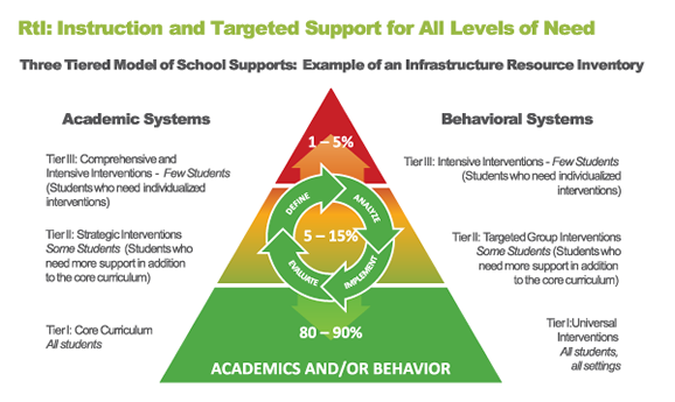Response to Intervention
Multi Tiered Systems of Support: RTI
Response To Intervention In Reading

Whittier City’s commitment to literacy is reflected in the alignment of all assessment and intervention programs to address critical literacy skills, especially in the foundational years of Kindergarten through 2nd grade. After piloting reading interventions at a few schools, a district-wide Response to Intervention (RTI) initiative was launched in 2014.
Core principles: We can effectively teach all children
We must intervene early
Bolstered by research on the development of reading in students, we set learning targets for each grade level.
By the end of this grade level: Students will demonstrate this reading skill:
Kindergarten Phonemic Awareness
1st through 3rd grades Phonics Skills
4th through 8th grades Comprehension Skills
_______________________________________________

Tier 1
The familiar RTI triangle illustrates the primary focus on Tier 1 quality instruction for all students. This includes a balanced literacy approach that provides foundational reading skills such as letter knowledge and phonics in the meaningful context of reading books and developing writing skills.
But, how will we know if students need help?
Tier 1: Universal Screening

The RTI initiative created a common universal screening process across district schools, and provided guidance on how to match students to the interventions they need. All students are tested individually to determine their reading levels (A-to-Z levels). This guides teachers and parents in selecting books to provide the most appropriate reading practice for their students. If needed, students who are reading below grade level expectations are administered further placement tests to match them to the most appropriate reading intervention program to match their needs. The universal screen is repeated three times per year and is administered to students who move-in during the school year. These measures ensure that all student reading levels are identified. Beginning in the 2017-18 school year, all schools also complete a universal screen for social-emotional-behavior concerns.
Tier 2: Common Reading Intervention Programs Across Schools
In addition to their core literacy instruction in their classrooms, students who score below benchmark levels in reading are provided small group intervention with evidence-based reading intervention programs. These programs have been selected because they target the critical literacy skills described earlier (for example, phonics or comprehension). Having common programs ensures consistency across schools so that all students are provided the same opportunities for learning, no matter which Whittier City school they attend and even if they change schools during their time with us.
|
Evidenced-Based Reading Intervention Program Options |
||||||
|
|
K |
1st |
2nd |
3rd |
4th-5th |
6th -8th |
|
SIPPS (Beginning) |
• |
• |
||||
|
Read Naturally© GATE |
• | • | ||||
|
SIPPS (Beginning, Extension, Challenge, Plus) |
|
|
• | • | • | • |
|
Phonics for Reading |
• | • | • | • | ||
|
Rewards |
• | • | • | |||
|
Junior Great Books |
• | • | • | |||
|
Comprehension Toolkit |
• | • | • | |||
|
Making Meaning |
• | • | • | |||
About Intervention Groups
Groups range in size depending on the intensity level of a group’s academic needs – the more intensive the need, the smaller the group. This allows staff to provide more attention and more immediate feedback to students as they practice their skills. Schools tend to run two to three cycles of intervention during a school year, lasting from 8 to 12 weeks or longer. Groups generally meet three to four times per week for 30 minutes.
Groups can be led by teachers or by instructional assistants. Staff are provided training opportunities in the different programs at the beginning of each school year.
Monitoring Progress
The phonics based interventions (SIPPS) have built-in quizzes so staff can monitor student progress and be aware of which skills need extra instruction. At the end of each cycle, placement tests are repeated and intervention groups can be re-arranged to adjust to the student’s advancing reading skills.
Parent Communication
The classroom teacher notifies parents that their student is receiving reading intervention support by providing a letter outlining the MTSS/RTI program and indicating at which Tier of support the student is participating. There is an accompanying handout describing the different reading intervention programs.